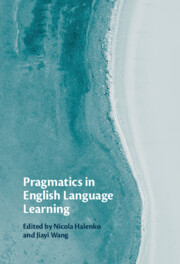Book contents
- Pragmatics in English Language Learning
- Pragmatics in English Language Learning
- Copyright page
- Contents
- Figures
- Tables
- Contributors
- Foreword
- Acknowledgements
- Introduction
- 1 Second Language Pragmatics
- Part I Pragmatics in Action
- Part II Instructed Pragmatics
- 6 Interlanguage Pragmatic Development in a German EFL Secondary School Context
- 7 ‘Learning to Say “No” in Different Ways’
- 8 Using Self-Access Materials to Learn Pragmatics in the US Academic Setting
- Conclusion
- Index
- References
7 - ‘Learning to Say “No” in Different Ways’
Tracking EFL Learner Performance and Perceptions of Pragmatics Instruction in Mexico
from Part II - Instructed Pragmatics
Published online by Cambridge University Press: 29 September 2022
- Pragmatics in English Language Learning
- Pragmatics in English Language Learning
- Copyright page
- Contents
- Figures
- Tables
- Contributors
- Foreword
- Acknowledgements
- Introduction
- 1 Second Language Pragmatics
- Part I Pragmatics in Action
- Part II Instructed Pragmatics
- 6 Interlanguage Pragmatic Development in a German EFL Secondary School Context
- 7 ‘Learning to Say “No” in Different Ways’
- 8 Using Self-Access Materials to Learn Pragmatics in the US Academic Setting
- Conclusion
- Index
- References
Summary
This quasi-experimental study tracks the efficacy of a planned explicit intervention with an EFL learner group in Mexico, using the under-researched speech act of refusals as the pragmatic target. Thirty university students were recruited to an Experimental (N=15) or Control group (N=15) to measure instructional effects of a ten-hour training programme which employed a pre-test, post-test design. Performance results were enhanced with semi-structured interviews to identify learners’ cognitive processes when producing refusals and their perceptions of the pragmatics training. The findings revealed the pragmatic instruction facilitated more elaborate refusals which showed increased sensitivity to sociopragmatic aspects. Both the frequency and variety of indirect strategies and adjuncts were markedly different to those produced by their non-instructed counterparts. This positive trend in the quantitative findings was also corroborated in the qualitative data. The interview data highlighted the instructed group’s cognitive processes when carrying out the pragmatic tasks and showed the learners’ planning and thought processes when performing refusals were different before and after receiving instruction.
- Type
- Chapter
- Information
- Pragmatics in English Language Learning , pp. 173 - 199Publisher: Cambridge University PressPrint publication year: 2022
References
- 1
- Cited by

